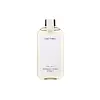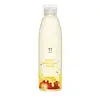What's inside
What's inside
 Key Ingredients
Key Ingredients

 Benefits
Benefits

 Concerns
Concerns

No concerns
 Ingredients Side-by-side
Ingredients Side-by-side

Water
Skin ConditioningHoney Extract
HumectantDipropylene Glycol
HumectantSodium Hyaluronate
HumectantGlycosyl Trehalose
Emulsion StabilisingHydrogenated Starch Hydrolysate
HumectantBetaine
HumectantSodium Carbomer
Emulsion StabilisingAllantoin
Skin ConditioningAloe Barbadensis Leaf Juice
Skin ConditioningBacillus/Soybean Ferment Extract
Skin ConditioningPortulaca Oleracea Extract
Skin ConditioningPEG-40 Hydrogenated Castor Oil
EmulsifyingPPG-26-Buteth-26
Skin ConditioningDisodium EDTA
Phenoxyethanol
PreservativeMethylparaben
PreservativeCI 15985
Cosmetic ColorantParfum
MaskingWater, Honey Extract, Dipropylene Glycol, Sodium Hyaluronate, Glycosyl Trehalose, Hydrogenated Starch Hydrolysate, Betaine, Sodium Carbomer, Allantoin, Aloe Barbadensis Leaf Juice, Bacillus/Soybean Ferment Extract, Portulaca Oleracea Extract, PEG-40 Hydrogenated Castor Oil, PPG-26-Buteth-26, Disodium EDTA, Phenoxyethanol, Methylparaben, CI 15985, Parfum
 Reviews
Reviews

Ingredients Explained
These ingredients are found in both products.
Ingredients higher up in an ingredient list are typically present in a larger amount.
This ingredient comes from honey made by bees. It is hydrating, antibacterial, anti-aging, and skin soothing.
Honey also contains amino acids, peptides, Vitamins A, C, and E.
The humectant property of honey draws moisture from the air to your skin. This makes it great at helping to hydrate the skin.
Honey may help reduce the signs of aging due to its antioxidant properties. Fun fact: darker honey has more antioxidants than light honey. The antibacterial property of honey may make it effective at helping to treat acne by killing acne-causing bacteria.
Many people wonder if honey extract is vegan. It is technically a byproduct from bees. This is because honey is created from the digestive enzymes in a bee's stomach.
Remember to be kind to bees :) They are important for many ecosystems and are endangered.
Learn more about Honey ExtractSodium Hyaluronate is hyaluronic acid's salt form. It is commonly derived from the sodium salt of hyaluronic acid.
Like hyaluronic acid, it is great at holding water and acts as a humectant. This makes it a great skin hydrating ingredient.
Sodium Hyaluronate is naturally occurring in our bodies and is mostly found in eye fluid and joints.
These are some other common types of Hyaluronic Acid:
Learn more about Sodium Hyaluronate